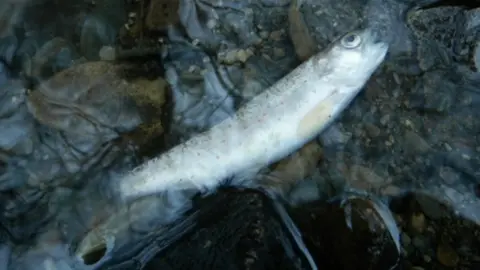River pollution: Better regulation call after 3,000 incidents
 BBC
BBCThere have been almost 3,000 pollution incidents in Welsh rivers in the past three years, but only 38 prosecutions.
Thousands of fish have died with 17% of issues caused by water companies and 15% by agricultural leaks.
Figures from January 2013 to February 2016 come a year after a large slurry leak in the River Teifi in Ceredigion.
Afonydd Cymru has called for better regulation, while Natural Resources Wales (NRW) said most incidents were minor and did not warrant prosecution.
Figures released by NRW under the Freedom of Information Act show Carmarthenshire's River Loughor logged the most incidents with 191.
 Google Maps
Google MapsThe River Ebbw at Sirhowy in Caerphilly county had the next highest incident log with 145 cases, while the River Ogmore followed with 121.
Enforcement action was taken in 1,318 of the total 2,706 cases but, in the majority, no further action was taken due to insufficient evidence for an investigation.
In most other cases, advice or guidance was given to prevent another incident, formal cautions or warnings were given, but there were only 38 prosecutions.
Natural Resources Wales said the type of pollution varied across Wales, with mostly agricultural incidents in south west Wales, with more varied causes in south east Wales.
A spokeswoman said the majority of incidents were minor but action would be taken against those responsible if a source was identified. The sanction depends on the seriousness of the incident.
She said: "NRW always seeks to be proportionate in its enforcement responses, applying our regulatory principles and policies.
"Prosecution is not the only enforcement response available and in some cases there is also an option for the offender to offer an enforcement undertaking, whereby appropriate mitigation and compensation is provided to address the problem and to also potentially improve the environment impacted by the original pollution.
"In some suitable instances this can provide a better environmental outcome than prosecution."
 Getty Images
Getty ImagesDr Stephen Marsh-Smith, chief executive of Afonydd Cymru, which represents rivers trusts of Wales, said fish stocks and the eco-systems they support had declined in the past five years as a result of pollution.
He called for better regulation of the farming industry to ensure slurry leaks and illegal dumping were reduced, and said a more preventative approach - such as that taken by England's Environment Agency, which predicts where pollution might happen and works with industries to mitigate it, was needed.
He added: "It's a question of money at the end of the day and, if we want NRW to do something about it, you do have to pay a little money.
"There's still a lot of EU money about that could partially help."
A Welsh Government spokesman said it wanted to work with industry to reduce the "number of significant agricultural pollution incidents in recent years".
"The agricultural use of nitrates is a major source of water pollution. Following an extensive consultation on nitrate vulnerable zones, the cabinet secretary last month announced work would get under way with partners over the coming months to develop a cross-Wales approach and the right balance of comprehensive regulatory and voluntary measures.
"We are working closely with NRW to find additional sources of income."
